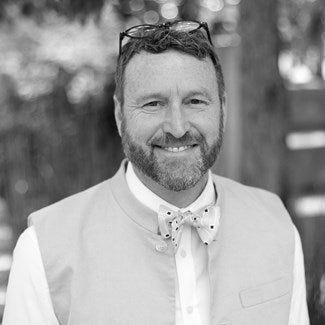Louis P. Nelson
Education
University of Delaware, PhD
University of Delaware, M.A.
The College of William and Mary, B.A.
Biography
Louis P. Nelson is Professor of Architectural History and the Vice Provost for Academic Outreach. He is a specialist in the built environments of the early modern Atlantic world, with published work on the American South, the Caribbean, and West Africa, and is a leading advocate for the reconstruction of place-based public history.
At UVA and in Charlottesville, this work has taken the form of scholarship that contextualizes the four monuments installed at the height of Jim Crow segregation, walking tours and movies that seek to disseminate a broader understand of how racism is inscribed in the local landscape, a university renaming commission, partnership on a new website for and a narrative interpretation of the new Memorial to Enslaved Laborers, and co-editing both a digital series on UVA and the History of Race and Educated in Tyranny: Slavery at Thomas Jefferson’s University. He was also the lead author and co-PI on Race, Place and Equity, a $5M Andrew Mellon Foundation funded grant.
Nelson has also had an impact on public interpretation beyond his hometown. In the summer of 2020, he was awarded funding for “Recovering Erased Histories” another Andrew Mellon grant supporting three team-led and community-engaged field schools to document African American cultural landscapes. He is part of the advisory team for an NEH funded initiative to extensively revise the interpretation of the Hermann-Grima House in New Orleans. He has also argued for the preservation of the damage to the US Capitol building from the January 6 insurrection as an important threshold in the history of American Democracy.
On the International stage, he is a member of the international Institute for Historical Research funded seminar “The World in a Historic House” and has just begun a new partnership with the curators of Dyrham Park in South Gloucestershire in England and has previously worked with the Maison des Esclaves on Goree Island, Senegal and built an online platform, the Falmouth Project, a GIS-based data information system used as a repository for ongoing work in Falmouth, Jamaica.
Nelson is an accomplished scholar, with two book-length monographs published by UNC and Yale University Presses, three edited collections of essays, two terms as senior co-editor of Buildings and Landscapes--the leading English language venue for scholarship on vernacular architecture--and numerous articles. He is also a celebrated teacher, having won a university-wide teaching award in 2007 and serving as the 2008 UVA nominee for a state-wide Outstanding Faculty Award. Nelson's teaching and research focuses on the close examination of evidence-both material and textual-as a means of interrogating the ways architecture shapes the human experience. The majority of his work focuses on the early American South, the Greater Caribbean, and the Atlantic rim. His most recent monograph, Architecture and Empire in Jamaica (Yale, 2016) won three major book awards and was very positively reviewed in twelve different venues including both popular—Times Literary Supplement—to scholarly—William and Mary Quarterly, Art Bulletin and Architectural History, many calling it a tour de force in the field. His early work on colonial religious architecture is best realized in his monograph, The Beauty of Holiness: Anglicanism and Architecture in Colonial South Carolina (UNC, 2008). Winner of the 2010 SESAH Best Book of the Year Prize, The Beauty of Holiness examines the ways Anglican churches in colonial South Carolina-the nexus of many social landscapes-express regional identity, social politics, and divergent theologies of the sacred. "Sensing the Sacred: Anglican Material Religion in Early South Carolina," published in the Winterthur Portfolio, was also recognized for its contributions to the field of architectural history; it was named the 2008 SESAH best article of the year.

